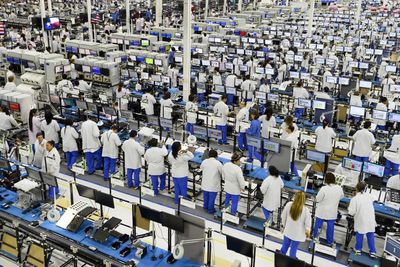In a lengthy piece detailing the hardships that workers in Apple's supply chain can face, Bloomberg follows the story of a factory worker at Flextronics International, a contract manufacturer based in Singapore and Kuala Lumpur that produced camera parts for the iPhone 5.
Ahead of the launch of the iPhone 5, Flextronics had to significantly ramp up production, hiring a 1,500 new employees via brokers and recruiters in Nepal, Malaysia, and surrounding areas. Because factory jobs are highly desired, many families pay upfront fees to brokers to acquire the positions, resulting in loans that can take "imported" workers years to pay off, with factory managers controlling when workers are able to leave.

For the iPhone 5 rollout, a recruiter working for Flextronics contacted four brokers in Kathmandu, Nepal's capital, in late August and early September, urgently seeking 1,500 men to make cameras, according to three of the four brokers. The pressure to move so many men so quickly was unprecedented. "The recruitment agency was telling me, 'We need these workers, you have to send them by today,'" says Rajan Shrestha, managing director of a small company called Sharp Human Resources.
The frenzy to hire workers was how one Nepalese man, Bibek Dhong, found himself paying $250 and handing over his passport to a recruiter who promised him a good job. Dhong was forced to pay another $500 to a broker (6 months of his wages from his former job as a dairy farmer) and sign a debt agreement stating he would pay $400 more. Dhong was told to keep his broker fees secret, as Apple has a policy that prevents excessive charges by recruiters.
Last year [Apple's] audits turned up $6.4 million in fees paid by workers beyond the company's prescribed limit—compared with $6.7 million in the previous four years combined. And Apple audited fewer plants last year than it did in 2011. The company orders its suppliers to refund workers charged beyond its limit.
The Flextronics plant where Dhong was inspecting cameras experienced high failure rates before slowing and shutting down production. Because Flextronics retained Dhong's visa, he was unable to leave, stuck in a hostel in Malaysia with no food. After two months, he was permitted to return home, where he had to sell off much of his land to pay his debts and take a low paying job to continue to pay off the rest of the money for the factory job he didn't get to keep.
According to an Apple spokesman, Apple aggressively investigates claims of bonded labor where Apple products are made, and has mandated reimbursement to employees charged excessive recruitment fees.
"We aggressively investigate any claims of bonded labor where Apple products are made, and our team is continuously auditing deeper into the supply chain. We recently updated our code of conduct to require our suppliers to directly interview workers who are hired through labor brokers, as another way of eliminating unethical practices. Although Flextronics's Bukit Raja facility is no longer in Apple's supply chain, we take these allegations extremely seriously."
Apple has frequently been in the spotlight over the conditions at the factories where its products are made and the company has low tolerance for factories that violate its rules. For example, in January, Apple dropped one supplier for using underage workers. It is, however, an ongoing battle for Apple, as many factories are aiming to produce high volumes of products at low costs, often defying labor rules to keep profits high.
Earlier this year, Apple formed a Supplier Responsibility Academic Advisory board to work on providing "safe and ethical working conditions" wherever Apple products are made. The company also maintains an annual Apple Supplier Responsibility report [PDF] tracking its efforts to improve working conditions for factory employees.
Flextronics remains an Apple partner, and will run an Austin plant that will be responsible for the production of Apple's upcoming Mac Pro.





















